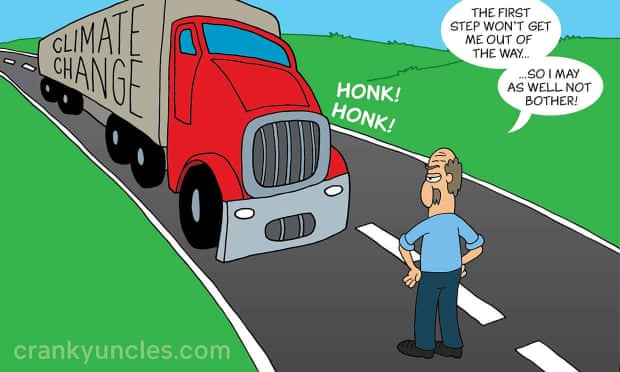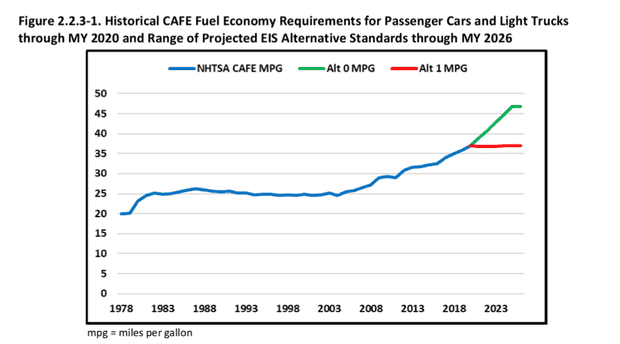
A cartoon illustration of the Trump administration’s climate policy logic Illustration: John Cook
Several years ago, I wrote about& the five stages of climate denial.& To date, the Trump administration has pinballed between Stages 1, 2, and 3, calling climate change& a Chinese hoax,& disputing the degree of human causation& (100% since 1950), and& claiming it’s not a threat.& But the purpose of climate science denial is to obstruct climate policies, and science denial doesn’t hold up in court.& Unlike in the political realm, judicial decisions are generally based on evidence.&
The Trump administration wants to roll back& the Obama administration’s increased vehicle fuel efficiency standards.& But under the National Environmental Policy Act (NEPA), “if a proposed major federal action is determined to significantly affect the quality of the human environment,” the agency has to publish an environmental impact statement (EIS).

Vehicle fuel efficiency standards to date (blue) and required under the Obama administration rules (green) and the Trump administration’s proposal (red) Illustration: National Highway Traffic Safety Administration
And so, the National Highway Traffic Safety Administration (NHTSA) was required to& publish an EIS& detailing how the proposed fuel efficiency rollbacks would impact the environment, including via climate change.& Here, the Trump administration shifted to Stage 4 and 5 climate denial.
We’re screwed anyway, what’s the big deal?
In modeling the proposal’s climate impact, the NHTSA assumed we will follow a scenario in which Earth’s average surface temperatures will warm 3.5°C (6.3°F) by 2100.& That’s surprisingly realistic &- it’s a scenario in which countries& follow through with their current climate policies& but don’t enact any more stringent ones in the future.& The problem is that the NHTSA assessment then concluded the fuel efficiency rollbacks aren’t important because they won’t have a significant impact on those hotter global temperatures:
The impacts of the Proposed Action [freezing fuel efficiency standards] and alternatives on global mean surface temperature, precipitation, sea level, and ocean pH would be extremely small in relation to global emissions trajectories. This is because of the global and multi-sectoral nature of climate change. These effects would be small, would occur on a global scale, and would not disproportionately affect the United States.
This is true.& The Trump administration proposal decreases vehicle fuel efficiency requirements in the United States for the years 2020&-2025.& & Of course& it won’t have a big global impact relative to all greenhouse gas emissions from two centuries of burning fossil fuels.& The report continues:
The emissions reductions necessary to keep global emissions within this carbon budget could not be achieved solely with drastic reductions in emissions from the U.S. passenger car and light truck vehicle fleet but would also require drastic reductions in all U.S. sectors and from the rest of the developed and developing world.
We could make this argument about literally any and every individual climate policy.& Just like a single step won’t move a person safely out of the path of an oncoming truck, no single climate policy will significantly change global temperatures eight decades from now.& It will take a myriad of climate policies passed by countries all around the world.& That’s precisely why virtually every country& signed the Paris climate agreement.& The report’s maddening illogic doesn’t stop there:
Comments